|
Genres, Themes, Actors, and Directors:
- Childhood
- Class Relations
- Coming-of-Age
- Friendship
- Japanese Films
- Prostitutes
Review:
Kohei Oguri’s little-seen debut film (currently unavailable to English-speaking audiences)* remains one of the finest movies ever made about childhood friendship. I rented Muddy River as a region-coded DVD with Chinese subtitles, using a computer-generated translation program to help me decipher what the characters were saying. As a result, I inevitably lost much of the nuance of the dialogue, but fortunately, most of the film’s power lies in wordless interactions, facial expressions, beautiful cinematography, and a haunting film score. Oguri perfectly captures the details of children’s interactions with each other: the excitement over showing off a trick or inviting a new friend to one’s home; the illicit thrill of spying on adults as they watch sumo wrestling on television in a bar. But he also skillfully portrays the harder lessons of childhood, such as witnessing a violent death, or having to stick up for a new friend when everyone else rejects him. Each scene in Muddy River carries weight and meaning, but the movie is never overbearing; instead, Oguri simply allows us to witness a kind young boy as he comes of age, while life — both harsh and exciting — carries on around him.
* Update: This movie now appears to be available on DVD with English subtitles!
Redeeming Qualities and Moments:
- A simple yet powerful evocation of a childhood friendship which transcends class
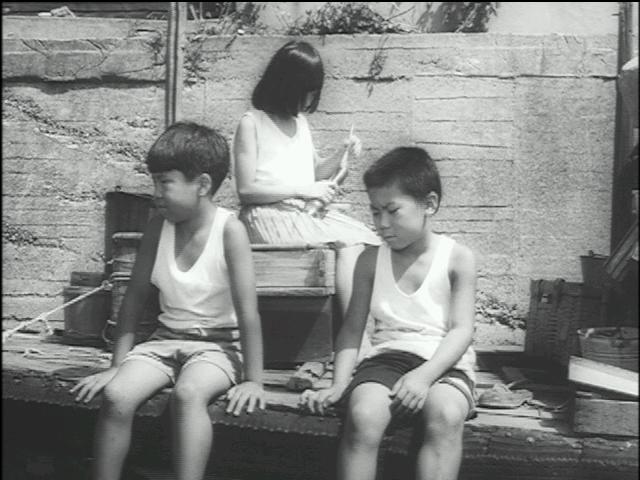
- Excellent use of riverside locales and sets

- Round-cheeked Nobutaka Asahara as Nobuo
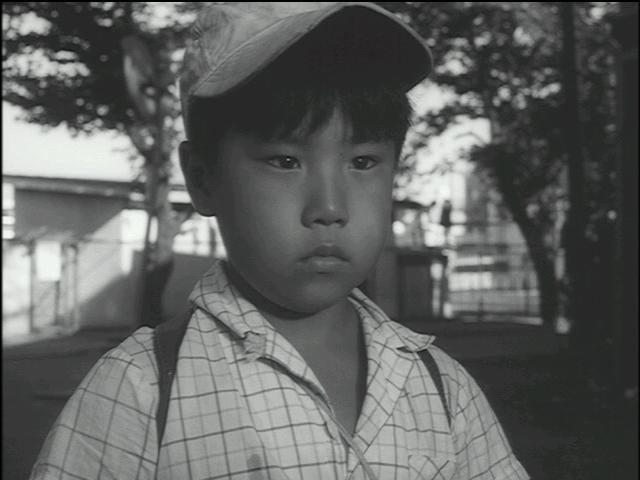
- Takahiro Tamura and Yumiko Fujita as Nobuo’s well-meaning parents (seen below in their attempt to make Kiichi and his sister Ginko feel comfortable during dinner)
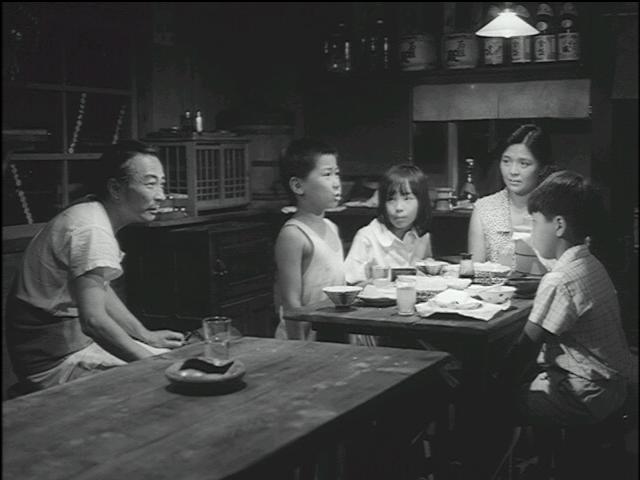
- Kiichi smiling and doing somersaults to express his delight after Nobuo defends him in front of some neighborhood boys
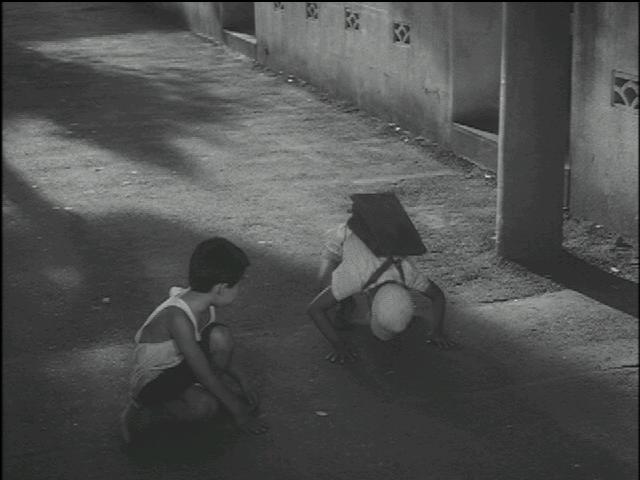
- Stunning black-and-white cinematography by Shohei Ando
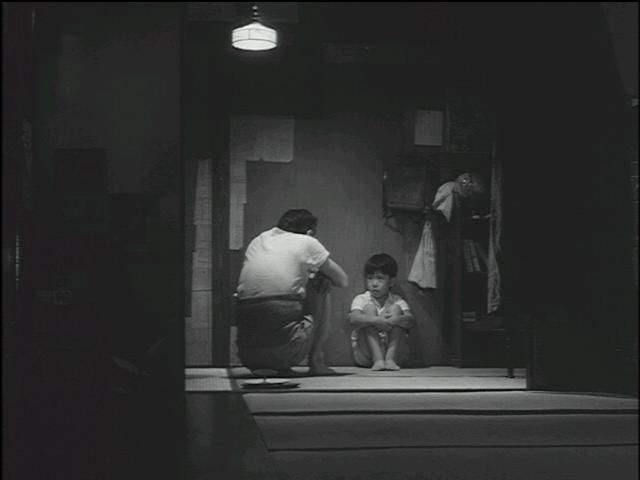
- A truly heartbreaking ending
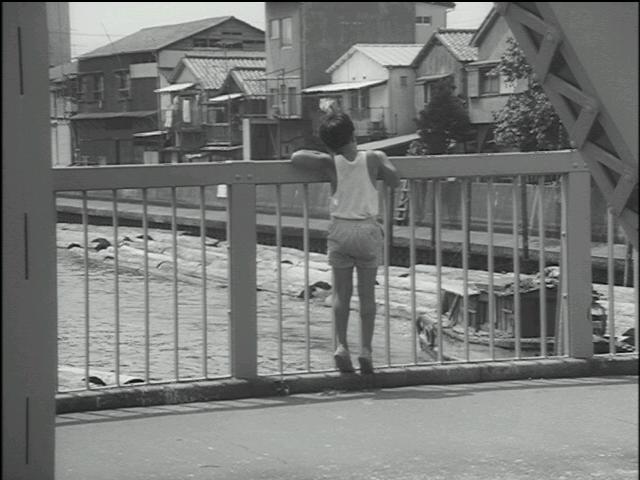
- An appropriately elegiac film score by Kurodo Mori
Must See?
Yes; it’s a gem.
Categories
Links:
|
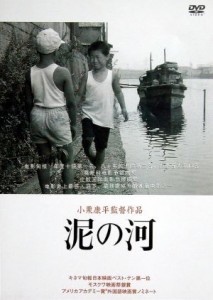

3 thoughts on “Muddy River (1981)”
An absolute must! This is one of those times I’d like to know of a petition to secure DVD release; “Muddy River’ is 25 years old and (unless you live in Japan, which is how I got a copy years ago) is in danger of becoming a lost film. Director Oguri has only made four films since. I don’t know the last two, but “For Kayako’ and “The Sting of Death’ (which, in 1990, received the Cannes Jury’s Grand Prize) seem labored by comparison — “Muddy River’ is perfectly realized. Not only is it one of the best films about children, it is devoid of cloying elements — as such, it’s on a par with “To Kill a Mockingbird’: here, too, Nobuo views his father much in the way that Scout looks up to hers.
A tone of quiet intensity is maintained throughout. Though the story unfolds in an episodic manner, the dual thread of understanding and forgiveness is constant and potent. Particularly impressive is the naturalness of just about the entire cast — one feels they really are these people.
If I were to list memorable scenes in this personal fave, I’d end up outlining the script. Chief among them, though: in a moving sequence in which the prostitute’s son and daughter are enjoying an evening with Nobuo and his family, the son is genuinely surprised to hear his sister laughing in another room; when Nobuo and the son go to a village festival, Nobuo has the son handle the little money they have — neither of them aware of the hole in the son’s pocket; that ending! — when Nobuo is made to realize the friendship he may be losing and valiantly tries to keep it.
My mother said she saw it at a screening many years ago at Columbia University. It made a deep impression on her and she’s been looking for it since. She’s found versions, but as a Chinese native speaker, she’d prefer a version with Chinese subtitles (opposite problem as yours!). How can we get access to the version with Chinese subtitles? Or English for that matter?
I found a copy at a rental place that carries DVDs from other regions of the world. The copy I rented at the time I wrote my review didn’t have English subtitles, so it would have been perfect for your mother! (I got my Chinese-speaking friend to help me decipher what was being said.) This was several years ago, but it’s a store in L.A. called Cinefile, if you’re ever in that neck of the woods. They carry lots of obscure and/or foreign titles.